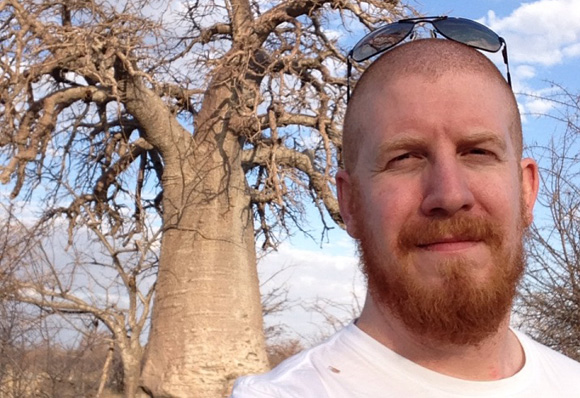
Paul Voigt’s work for biotechnology firm Cavidi takes him all over Africa. Image courtesy of Paul Voigt.
Biotech in Business: Profile of Paul Voigt
“Let’s be frank: biotech is about business. If it’s not business orientated, then it’s just biochemistry or
molecular biology.”
That’s the view of Paul Voigt, regional manager in Africa for a biotechnology firm called Cavidi –
a small Swedish company that sells a novel HIV viral load monitoring tool all over the world.
But how does one get into this kind of position? It’s a question that many recent local graduates ask themselves in the context of South
Africa’s nascent biotechnology sector.
“Our government spends a lot of money on biotech programmes, but I feel that a branch out of academia is still lacking,” says Voigt.
“For every 20 PhDs, there is one job.”
Voigt obtained a Bachelor’s degree in Pharmacy and a Master’s in Pharmacology at Rhodes University. In order to be a registered pharmacist,
he spent a year managing an ARV clinic in rural Eastern Cape. He describes the experience as “really un-awesome, actually”, but says that
it certainly played a role in getting him to where he is today.
He later obtained a Professional Doctorate in biotechnology in Australia. This qualification is a cross-over between an MBA and PhD, where the emphasis
is placed on business development, innovation, and intellectual property management. “I didn’t want to do a superfluous PhD that means nothing
to anyone,” he says. “I wanted rather to do something that helps my career.”
Voigt returned to SA to pursue that career: he consulted for a few firms before joining Cavidi full-time to look after their interests in the African market.
Working with a colleague in Cape Town, he markets Cavidi’s technology to new countries, and provides support and training in countries where the
technology is already being used.
“I do business development. I do sales. I do training. When they need something done in Africa, they say, ‘Paul, make Africa a market that
works’.” In practical terms, this means travelling a lot, talking to governments and government labs, and generally making connections with
scientists, politicians and doctors throughout Africa.
What is he selling? Cavidi’s flagship product is an enzyme-based viral load assay, and it is the only one of its kind in the world.
“Viral load is a much more effective measure of anti-retroviral therapy success and overall patient health,” says Voigt. He is comparing it
with the more commonly used CD4 count, which is only an approximation, or a ‘proxy’ in the language used by immunologists, of HIV viral load
(a low CD4 count is associated with a high viral load).
Cavidi’s system offers the sensitivity of a PCR-based assay without the associated high costs to establish the system – R150 000 rather than
more than R1.5 million.
Their assay makes use of an HIV enzyme called reverse transcriptase (RT). RT is responsible for turning the genetic material of the virus (RNA) into DNA so
that it can make more copies of itself using the machinery of human cells.
In Cavidi’s test, HIV particles are isolated from a patient’s blood and then broken up to release the RT enzyme. This is then mixed with a sample
of RNA. Via simple colour change, the test measures the conversion of that RNA into DNA (it uses a dye attached to a monoclonal antibody that produce a colour
change when they come into contact with DNA). The intensity of the colour change thus shows the patient’s viral load, and it is as accurate as the PCR-based
methods.
Voigt obviously loves his job, and says he couldn’t imagine doing anything else with his life. “I do feel like I’m helping humanity,” he
says with a smile. “I’m making it easier for people in Africa to get a viral load test, and a test can save someone’s life.”
Beyond that, he says that travelling in Africa and meeting the people from around the continent are some of the most rewarding parts of the job for him. Working
from his home in the leafy Southern Suburbs of Cape Town is also a big plus.
As to the future of Cavidi and his place in it: the company is competing with some of the biggest pharmaceutical companies in the world, but Voigt is confident,
saying “Cavidi will be the ultimate HIV monitoring solution, and my job is to make sure that happens”
Dr. Paul Voigt is regional manager in Africa for
Cavidi.
|
|